Champions of Change Blog
Using Partnerships to Reach Into Communities
Posted by on October 27, 2014 at 9:35 AM EST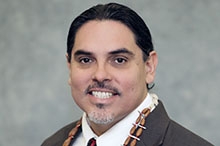
Mark LeBeau is being honored as an Affordable Care Act Champion of Change.
In California, tribal governments, tribal health programs, and the California Rural Indian Health Board (CRIHB) worked together to develop and share educational materials about the Affordable Care Act prior to its passage. Upon enactment of the ACA, CRIHB partnered with the Northwest Portland Area Indian Health Board, Oklahoma City Area Inter-Tribal Health Board, and United South and Eastern Tribes to develop tribal-specific educational materials about the legal rights of tribes and American Indian and Alaska Natives (AIANs) under the ACA. These partners each contributed funds to help make this work a reality.
This program became known as the Tribal Education and Outreach Consortium (TEOC). The people involved in this work became highly knowledgeable about the subject matter and formed a training program called TEOC University, which trained trainers to present the information to tribal communities. This was the first tribal work of this type in the United States, and the TEOC materials have been distributed throughout Indian Country.
Today, a number of federal and state offices provide these materials. Many of these materials have been reviewed and updated by CRIHB and the other members of TEOC. One of the most well-known programs we’ve helped with has been the National Indian Health Outreach and Education Initiative (NIHOE). This is a partnership between the Indian Health Service (HIS), the National Congress of American Indians, the National Indian Health Board, and representatives from each of the 12 IHS Areas. The partnership develops consumer-oriented materials to assist AIANs in understanding their opportunities under the ACA. Together, the partners provide local trainings, national marketing tools, and e-resources that clearly explain health reform changes and their impact on tribal communities. CRIHB has presented these materials to tribal governments, Indian health programs, and Indian communities and organizations.
To ensure the successful roll-out of the ACA in California, CRIHB policy staff have been meeting with state officials on a regular basis. In addition, CRIHB has reached out to the Northwest Portland Area Indian Health Board (NPAIHB) for input in developing successful implementation strategies and tactics.
These strategies and tactics were incorporated into a proposal developed by CRIHB, which was presented to the state as a necessary and fundable ACA program. Eventually, the state agreed to fund our program. As a result of this work, the Covered California Tribal Community Mobilization program was created and funded at $250,000. The grant designated funds to support implementation of the ACA AIAN provisions and to meet the tribal consultation requirements outlined in federal guidance. While this grant will end in December of 2014, I and the rest of the folks at CRIHB will continue to seek additional financial resources in order to continue to implement this important work for Indian Country.
Mark LeBeau is Executive Director at the California Rural Indian Health Board.
Learn more about Health CareYou Too Can Make a Difference
Posted by on October 27, 2014 at 9:35 AM EST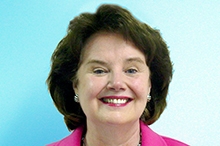
Pat Halpin-Murphy is being honored as an Affordable Care Act Champion of Change.
I am truly grateful to have been selected as a White House Champion of Change. I can’t tell you how much it means to me to be honored with this award.
As the President and Founder of the Pennsylvania Breast Cancer Coalition (PBCC), I lead a non-profit organization dedicated to finding a cure for breast cancer now so that our daughters won’t have to. I’m a breast cancer survivor, and twenty-five years ago when I was diagnosed I found that there wasn’t an organization in Pennsylvania dedicated to supporting women and families facing breast cancer. I founded the PBCC in 1993 to fill this void. In our twenty-year history, the PBCC has paved the way for countless legislative victories that support women and families across the state.
The best part of my work is talking to women about their experience with breast cancer and finding out what we can do to help meet their needs. For instance, we learned that many women were diagnosed with breast cancer in late stages because they have dense breast tissue. Upon learning this, we didn’t just sit by and wait for something to be done. Rather, we sprang into action and convinced Pennsylvania State Senator Bob Mensch to introduce legislation to help women with dense breast tissue receive improved information and screening so that they could be diagnosed at an earlier stage.
I believe that we all have the capacity to make a difference in our communities. Former U.S. Senator Harris Wofford made a tremendous impression on me as a leader. He recognized that each person has so much to contribute if only given the opportunity. He listened to people’s ideas and encouraged them to make those ideas become realities. Senator Wofford believed that everyone could contribute to their community. I truly believe that we can all make a difference. That’s the best part of this work. I’ve come to realize that, by simply standing up and taking action, we can all be “Champions of Change.”
Pat Halpin-Murphy is the President and Founder of the PA Breast Cancer Coalition.
Learn more about Health CareConnecting Muslims to Coverage
Posted by on October 27, 2014 at 9:35 AM EST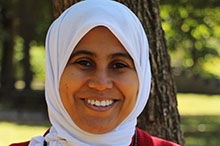
Khadija Gurnah is being honored as an Affordable Care Act Champion of Change.
There are a number of cultural, language, and financial barriers that prevent the traditional government messaging and resource dissemination strategies from reaching the Muslim community. These barriers vary greatly with each local community, as Muslim Americans represent diverse socioeconomic strata, immigration statuses, cultures, ethnicities, languages, histories, and religious approaches and interpretations. Assistance that is tailored to these diverse needs is critical to any effective public health initiative in the Muslim community.
American Muslim Health Professionals (AMHP) is a national, non-profit organization of American Muslims in health professions. During the last period of Open Enrollment, our goal was to cater to the needs of the uninsured Muslim population by promoting awareness of the benefits of the Affordable Care Act.
To achieve this, we had a two-pronged approach to outreach. At a grassroots level, we implemented enrollment campaigns in individual states. At a national level, we served as a resource for information and coordinated National Muslim Enrollment Weekend with a coalition of Muslim organizations.
At a grassroots level, we recruited “Community Liaisons” in seven states. The liaisons worked with their local faith communities to host enrollment and outreach events. We recognized that our communities needed cultural ambassadors to encourage their local faith communities to host events. Our most effective cultural ambassadors were recent graduates from health fields. They were excited, passionate, and well-established within their communities. AMHP also supported volunteers and partner organizations across the nation by connecting them with local Navigators and providing resources such as event planning guides, outreach materials tailored to Muslim communities, flyers, sign-up sheets, and a Jumah Khutba guide for imams to discuss the Affordable Care Act during sermons.
We established a clear tracking plan to help us keep metrics on outreach. We sent out a very simple form to anyone who planned to host an enrollment event. We also followed up afterward with another form. The form tracked attendance and enrollment and included a thank you to everyone for their time and commitment. We used the tracking form to update an online events page that allowed people to find enrollment events in their area.
We were also part of a national coalition of Muslim organizations that facilitated national Muslim Enrollment weekend. Together, we rolled out the first national health campaign targeting the Muslim community. We partnered with amazing facilitators at Get Covered America and the Department of Health and Human Services’ Office of Faith-Based and Neighborhood Partnerships to reach as many Muslim Americans as possible.
We were met with overwhelming support from the Muslim community. Over the course of the enrollment period, we made contact with 27,116 people and enrolled 1,662 people in high-quality, affordable health insurance plans.
As we prepare for the next enrollment period, we are looking forward to building upon our existing infrastructure to reach new communities across the nation. It is an honor to be part of this moment in our nation’s history and to help address the needs of our nation’s uninsured.
Khadija Gurnah is the Program Manager for the American Muslim Health Professionals’ Affordable Care Act outreach and enrollment efforts.
Learn more about Health CareAt the Intersection: Community, Policy, and Engagement
Posted by on October 27, 2014 at 9:35 AM EST
Niiobli Armah IV is being honored as an Affordable Care Act Champion of Change.
Since the inception of the Affordable Care Act, the NAACP has remained committed to ensuring that communities of color understand the benefits provided by the ACA and the importance of its implementation. The NAACP began by forging a number of partnerships with organizations across the nation to guarantee that communities of color remain a priority demographic for the implementation of the ACA. The NAACP Board of Directors passed a resolution identifying health coverage as a critical civil rights issue and mandating that all 38 state conferences in the organization facilitate workshops around the ACA at their fall 2013 conventions. We have focused on making sure communities of color are aware of their options under the ACA and have opportunities to participate in Open Enrollment activities.
I have found that ACA outreach is most successful when we focus not on health care but rather on upward mobility and quality of life. At its essence, health care affords millions of Americans the opportunity to go to work daily and provide for their families. Health insurance is a safety net that is often taken for granted. In designing our outreach strategy, I knew that we had to build a narrative that resonates with our communities.
The issue of health disparities naturally rose to the surface. People of color are diagnosed later than others, and they often die early from preventable diseases. Getting other organizations to understand the uniqueness of engaging communities of color has been a high priority for our outreach efforts. Organizations have struggled with what they define as “hard to reach communities,” but I believe there is no such thing as a community impossible to reach. After participating in many meetings with organizations thinking through community engagement, I have come to understand that the traditional approach needs adjusting. Singular interventions and initiatives focused on one particular issue are less successful than those that are more comprehensive and view an issue in its totality. Neither advocacy groups nor the communities they serve have the option of choosing what issues will take priority. For example, the same communities experiencing poor health outcomes are simultaneously dealing with issues of unemployment, education, violence, and mental health.
The second Open Enrollment Period begins on November 15, and we charge ourselves and other community organizations to find innovative ways to bring the important message of health care to the constituents they serve. No longer can we operate within silos by choosing what issue areas communities should prioritize. Instead, we must find the intersection of multiple issues so that we can address community problems holistically. To appropriately address health equity, more work must be done at the interaction of multiple issues.
Niiobli Armah IV is the Director of Health Programs for the National Association for the Advancement of Colored People.
Learn more about Health CareMiami Dade College Leads with Initiative to Reach Students and Engage Community
Posted by on October 27, 2014 at 9:35 AM EST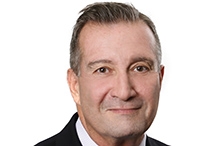
Joe Pena is being honored as an Affordable Care Act Champion of Change.
Miami Dade College (MDC) is the higher education institution with the largest campus-based enrollment in the United States, serving more than 165,000 students. Under the leadership of its president, Dr. Eduardo J. Padron, the institution has been elevated to national prominence for its innovation, programs of excellence, and service to the community.
President Padron designated me to coordinate a college-wide initiative to educate students, faculty, and the local community about their options under the Affordable Care Act. I was incredibly motivated to work on this project. Early on, we formed a partnership with Get Covered America, which sparked local community organizations and volunteers to assist with our efforts. We organized a series of successful educational outreach events, including workshops on multiple campuses. These events provided key information and enrollment assistance to all with an interest in signing up for health insurance.
The informational workshops were held on Saturdays and weeknights in the computer courtyards of four of our campuses stretching across all of Miami-Dade County. Holding these workshops in our computer courtyards allowed the trained assisters to educate the participants, explain the enrollment process, and answer questions directly.
Although I spearheaded this initiative, it came together as a result of the contributions of many in our institution. For Miami Dade College, this was an “all hands on deck” project focused on our students and local community. From our College and campus leadership to our administrators to our computer technicians and support staff, we were all motivated to pitch in, educating and assisting others about their health care options. The College District Office of Communications played a key role in announcing our outreach activities, generating media attention, and encouraging all to visit the HealthCare.gov website.
In the next enrollment period, we plan to once again partner with Get Covered America and the other community organizations to run educational workshops and to engage our communications network. In addition, we are organizing “office hours” on our campuses, allowing students and community members to set up individual enrollment assistance appointments with the trained assisters from the community organizations.
This MDC initiative is credited with having made a significant impact, improving the access to health care for thousands of residents in Miami-Dade County and throughout South Florida. I am proud to have been a part of this effort and to have been designated a “Champion for Change”.
Joe Pena is the Director of Federal Relations for Miami Dade College.
Learn more about Health CareAlleviating the Burden of Circumstance
Posted by on October 27, 2014 at 9:35 AM EST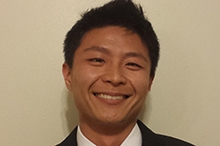
Peter Yang is being honored as an Affordable Care Act Champion of Change.
I believe that we are all products not only of our choices but also of our circumstances. There is a surprisingly prevalent misconception that people in adverse situations somehow deserve the hardships they face. Working in my community in Georgia, I’ve come to regard that idea as severely misguided; I have met so many hardworking individuals who, despite their best efforts, are trapped in a socioeconomic pit that they cannot dig themselves out of.
I first became involved in my community as an undergraduate at Emory University, when I saw the incredible impact of volunteerism in the surrounding community. During this time, I met many of the leaders and visionaries of the Asian American community in Georgia. Inspired by these individuals, upon graduation, I moved on to work at the Center for Pan Asian Community Services, where I was tasked with outreach for the Affordable Care Act during the first period of Open Enrollment. Prior to this work, my sole experience with the Affordable Care Act had been learning about its intricacies in a classroom setting. As I learned more about the program and its effect on the communities we serve, I began to see the law as a huge step in the right direction to improve the lives of the individuals that struggled with adverse circumstances.
Adequate access to health care is an essential part of human society. Some would even argue that it is a human right. Yet, the United States is severely behind the majority of other developed countries in providing that access. Georgia is home to one of the fastest growing populations of immigrants and refugees, and these individuals often lack adequate health insurance coverage. The more I worked with these individuals, the more I saw the human beings whose lives were impacted by the ACA.
The law has been successful thus far, but we still have more work to do. I am deeply honored to be selected as a Champion of Change but also just as honored that I have had the opportunity to serve these communities by promoting the Affordable Care Act.
Peter Yang is the Affordable Care Act Program Coordinator at the Center for Pan Asian Community Services.
Learn more about Health Care
- &lsaquo previous
- …
- 10
- 11
- 12
- 13
- 14
- 15
- 16
- 17
- 18
- …
- next &rsaquo
White House Blogs
- The White House Blog
- Middle Class Task Force
- Council of Economic Advisers
- Council on Environmental Quality
- Council on Women and Girls
- Office of Intergovernmental Affairs
- Office of Management and Budget
- Office of Public Engagement
- Office of Science & Tech Policy
- Office of Urban Affairs
- Open Government
- Faith and Neighborhood Partnerships
- Social Innovation and Civic Participation
- US Trade Representative
- Office National Drug Control Policy
categories
- AIDS Policy
- Alaska
- Blueprint for an America Built to Last
- Budget
- Civil Rights
- Defense
- Disabilities
- Economy
- Education
- Energy and Environment
- Equal Pay
- Ethics
- Faith Based
- Fiscal Responsibility
- Foreign Policy
- Grab Bag
- Health Care
- Homeland Security
- Immigration
- Innovation Fellows
- Inside the White House
- Middle Class Security
- Open Government
- Poverty
- Rural
- Seniors and Social Security
- Service
- Social Innovation
- State of the Union
- Taxes
- Technology
- Urban Policy
- Veterans
- Violence Prevention
- White House Internships
- Women
- Working Families
- Additional Issues

